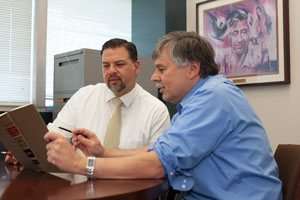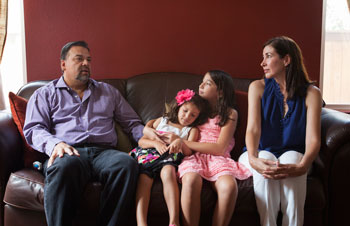Luis Rodriguez: First Latino bar
president paves the way forward
By Susan McRae
Special to the Bar Journal
State Bar President-elect Luis J.
Rodriguez doesn’t go in for fancy trappings. A 20-year veteran of the Los
Angeles County public defender’s office, he keeps his surroundings spartan and
utilitarian ― a desk, a few chairs, law books and a small conference
table.
But Rodriguez,
46, the first Latino and first lawyer from the public defender’s office to head
the 244,000-member organization, does pay
attention to history.
 |
Attorney Luis Rodriguez, incoming president of the California State Bar, left, talks with fellow attorney Mark Harvis in his office in downtown Los Angeles.
Photo by Stephanie Diani |
A poster on one wall commemorates the 50th
anniversary of Gideon v. Wainwright, the landmark 1963 U.S. Supreme
Court decision that led to the establishment of state public defender offices.
The ruling stems from the petition of Clarence Earl Gideon, a petty thief who
insisted that criminal defendants have a right to legal representation, whether
they can afford it or not.
Another wall displays a collage
featuring labor leader and Latino civil rights activist Cesar Chavez. Opposite
is a small bas relief of Mexican revolutionary Pancho Villa, a controversial
folk hero and one-time governor of Chihuahua, the Mexican state where Rodriguez
spent his formative years.
“Some people say these figures
contradict themselves, or maybe they wouldn’t sit at the same dinner table if
they were living at the same time,” Rodriguez says. “For me, it’s an
appreciation of history. You can’t sit there and judge an individual just
because of their political affiliation or something they did that wasn’t
necessarily popular. But you look at the impact the person had on society, the
type of change that the impact created.”
On Oct. 12, Rodriguez will have an
opportunity to make his own impact when he’s sworn in as the 89th president at
the State Bar Annual
Meeting in San Jose, a milestone that is eagerly anticipated by legal and Latino communities
at home and abroad.
“There’s so many firsts that Luis is
shattering,” said Paul Kiesel, a partner at Beverly Hills’ Kiesel & Larson
LLP.
“He’s the first Latino, which is so
appropriate in California. And I’m thrilled because he’s actively engaged with
the bar’s Open Courts Coalition,” an advocacy group Kiesel co-chairs that
lobbies for better court funding.
Rodriguez, who’s a past president of the
Mexican American Bar Association of Los Angeles County and of the California La
Raza Lawyers Association, will also be only the second president in the bar’s
history to come from the public sector. Karen Nobumoto, a deputy district
attorney, now retired, became the first in 2001.
“We need to have different perspectives
in the State Bar presidency,” said Holly Fujie, a past State Bar president and
now a Los Angeles County Superior Court judge. “It’s great to have someone like
Luis, who’s devoted his life to public service, to give of his time.
“He’s able to deal well with the
different personalities involved in the State Bar and also to plan so that his
objectives are met.”
Already, Rodriguez noted that his
election in July by the board of trustees has brought a new dynamic to the
organization.
He recently returned from a speaking
engagement to members of the Supreme Court of the Mexican state of Jalisco, who
wanted to learn about the California bar’s structure. He said the invitation is
one of many similar requests he’s received over the past several months.
His pending presidency also has drawn
interest from the Mexican, Central and South American consulates in Los
Angeles, which he said have signaled that Rodriguez’s bicultural and bilingual background
has inspired them to interact with the bar on a more formal level.
 |
Attorney Luis Rodriguez (left), incoming president of the State Bar, and his wife Yolanda Sanchez (right), talk about the Rodriguez' plans for his presidency in the family's home near downtown Los Angeles. Their two daughters, Tatiana, 4, and Natalia, 10, sit between them.
Photo by Stephanie Diani |
Rodriguez listed three priorities among
his many duties in the year ahead. At the top, he said, is trial court funding,
followed closely by oversight of those providing immigration services with the
anticipated passage of federal reform legislation. A third prime concern the
bar needs to address, he said, is the problem of law student debt.
Born in Los Angeles to Mexican
immigrants, Rodriguez moved as a toddler with his parents to Ciudad Juarez in
Mexico, where the family cared for his ailing grandmother. They returned to Los
Angeles about 10 years later, where Rodriguez attended public schools.
“I guess you could call me a reverse
immigrant in that I was born here but…my parents moved back to Mexico when I
was 2 or 3, and I went to kindergarten and half of the fifth grade there.”
Living in Juarez, Rodriguez recalls experiencing
prejudice at an early age. He said he distinctly remembers an incident when
police officers across the border in El Paso, Texas pulled his father over for
a traffic violation and began mocking his Mexican accent. Similar memorable incidents
happened to Rodriguez after the family returned to California. When he lived in the
modest Los Angeles suburb of Alhambra, Rodriguez recalls officers more than
once stopping him and his friends as
they drove through the nearby affluent enclave of San Marino, ordering them out of the car while police conducted a search.
Experiences such as those not only spawned
his interest in becoming a lawyer, he said, but also in getting involved in the
social and political structure of the community and country.
“I wanted to be in a position where I
could help people just like me, who didn’t grow up in an affluent neighborhood,
whose parents weren’t sophisticated enough to speak out for themselves,” he
said. “It matured and evolved into really appreciating what democracy is all
about. It may sound kind of hokey, but what I value most is the Constitution
and what it stands for. The fact that we are able to question authority in a
civilized manner and hopefully not be afraid of persecution.
“So, for me, having lived in a society
that called itself a democracy ― that being Mexico ― and seeing the
corruption that it had, and then seeing the inequities in this society [in the
U.S.], it was a natural step eventually to go to law school.”
The oldest of three brothers, Rodriguez
was the first in his family to attend college. He received his undergraduate
degree from Santa Clara University and law degree from the same campus. While
awaiting the bar results, he clerked for the federal public defender’s office
in Los Angeles and for a private firm. He joined the Los Angeles County public
defender’s office in 1994, rising over the years from deputy defender to
division chief.
Even before becoming a lawyer, Rodriguez
said he recognized the importance of getting involved. In high school, he formed
a group to encourage Hispanic students to prepare for college. As a lawyer, he
continued to speak to high school students about college and careers. He helped
set up teen peer review courts and became president of the Latino Public
Defenders Association. His activities eventually took him to Sacramento, where
he lobbied on behalf of the public defender’s office. His volunteer commitment
caught the eye of Michael Judge, the Los Angeles County public defender who had
hired him.
Judge, who retired in 2010, said he was
hoping that a new generation of leaders would emerge and that Rodriguez was
“one of a few people who really stood out.” Rodriguez, he said, was a reliable
force to represent the public defender’s office in court and to also handle
lobbying in Sacramento with issues that would help guide the office into the
next century.
“You see people who hang out at every
political event with no entrée, no credibility,” Judge said, “but when
[Rodriguez] was there, there was always an agenda that he thought needed to be
talked about and followed up on.”
Rodriguez’s interests didn’t stop at
promoting the public defender’s office but extended to the overall issue of
justice on both ends of the spectrum. When Steve Cooley, a Republican, ran for
Los Angeles County district attorney, Rodriguez, a Democrat, publicly supported
him during his first campaign and subsequent re-elections, citing what he
termed Cooley’s more sensible stand on three-strikes and extradition.
“I got a lot of flak from fellow public
defenders saying, ‘How can you support a prosecutor?’ and I said, ‘How could I
not?’ We have to work together … or the system is going to fail.” Later, he
said, other Democrats and public defenders joined in support.
Although Rodriguez’s State Bar leadership
role will demand much of his time in the coming year, like his predecessors, he’s
still expected to keep up his day job. Just last month, he began a new
assignment overseeing the appellate division, mental health court, paralegal
unit and sexually violent predator program — a steep learning curve, he says,
in unfamiliar territory.
Yet, the added responsibilities seem
only to invigorate him, and his open and relaxed manner belies his busy
schedule.
That easygoing style spills over into
his home life, as well. He and his wife, Yolanda Sanchez, an administrator in
the county health department, who was also born in Los Angeles and grew up in
Mexico, live with their children Natalia, 10, and Tatiana, 4, in a spacious and
airy Spanish-style home in the Monterey Hills. In their backyard overlooking
the San Gabriel Mountains, the girls show off a small garden that sports a
couple of impressive-looking cantaloupes almost ripe for picking.
Being the father of two daughters, it’s not
surprising that one of Rodriguez’s main concerns is women’s rights. He said
he’s looking forward to having his daughters stand beside him when Chief
Justice Tani G. Cantil-Sakauye administers the oath.
“It will be an opportunity for them to
see strong women in my area of the profession,” he said. He added that he’s
hoping they’ll also get a chance to meet U.S. Supreme Court Justice Sonia
Sotomayor one day. “I think it’s important for young women to start thinking
about taking leadership roles and knowing that they don’t need a male blessing
to be able to participate and to be successful.”
Summing up the year ahead, current bar
president Patrick Kelly observed how the organization has changed. Among its
accomplishments, he cited a renewed emphasis on public protection and outreach,
an effort to encourage civility among attorneys and the lack of a backlog in
attorney discipline cases.
“I know I can count on the new
trustees,” Kelly said of the changing makeup and focus of the board. “It’s a
different bar in terms of commitment and public outreach, and Luis is an
integral part of that.”
— Susan McRae is a
freelance writer who has covered the California legal community for 20 years.